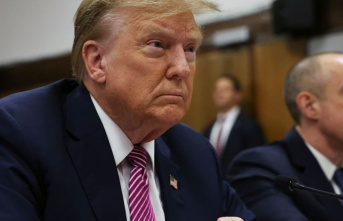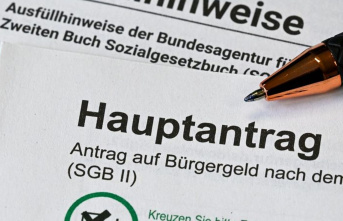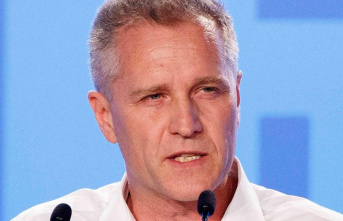This article first appeared on ntv.de.
At his last press conference with French President Emmanuel Macron, Russia's ruler denied any connection to the Wagner group mercenaries. "The Russian Federation has nothing to do with private military organizations operating in Mali," Putin said in the Kremlin on February 7, 2022.
Of course that was a lie. The Wagner group has been active in the African country since at least 2019, and they have also sent their mercenaries to other countries - to Syria, Libya, Sudan, the Central African Republic and a few more. She has been fighting in Ukraine for a year. It's a kind of return to the first crime scene, because Ukraine was also their first place of action.
Originally, the secrecy surrounding Wagner went so far that the ex-mercenary Marat Gabidullin did not want to comment on Prigozhin in an interview last summer, nor on Dmitri Utkin, the actual Wagner founder, a Russian right-wing extremist who had a swastika on his chest and had SS runes tattooed on his collarbone. Utkin's whereabouts are unclear, he is said to have last appeared in public in 2016.
Yet Putin and his regime have long since given up the game of hide-and-seek surrounding the former "shadow army." In September 2022, Prigozhin publicly acknowledged that he founded Wagner in 2014 to support alleged separatists in eastern Ukraine. Five months later, he admitted to starting a troll factory that Russia was using to try to influence the 2016 US presidential election.
Hardly a day goes by that Wagner boss Yevgeny Prigozhin doesn't speak up - either to attack Russian Defense Minister Sergei Shoigu for being incompetent, then ask him for help after all, or to boast that his mercenaries are conquering a city had, which the Department of Defense then denied.
The public dispute between Shoigu and Prigozhin is sometimes understood as a power struggle, and Prigozhin is even seen as a possible successor to Putin. The Bonn-based Russia expert Andreas Heinemann-Grüder considers this interpretation to be absurd. "There is no monolithic power structure in Putin's Russia," says the political scientist in an interview with ntv.de. "It makes sense for him if there is always a competitor who can step in if something doesn't work. In this sense, the Wagner group is there to put pressure on the regular military. But it also works the other way around: if Wagner doesn't able to accomplish a task, the Star of the General Staff rises."
The latter was observed a few months ago when Russian Chief of Staff Valery Gerasimov was appointed commander of the Russian invasion forces in Ukraine. The transfer of this task to the highest-ranking soldier in Russia was also a signal that the auxiliary troops like Wagner "are being put in their place to a certain extent", as Margarete Klein from the Stiftung Wissenschaft und Politik said at the time.
Putin uses his secret services, the military and the Wagner group to consolidate his own power. "The fact that there are irregular, commercial companies alongside the armed forces and the security apparatus is part of Putin's regime," says Andreas Heinemann-Grüder. The role of the Wagner group reminded him of the actions of the Stalinist regime: Josef Stalin, Soviet dictator from 1927 to 1953, had several groups compete against each other when developing the first Soviet atomic bomb. "The secret of his success was that he created competition in a system that wasn't actually intended," said Heinemann-Grüder. "For Putin, this approach means that he is not making himself dependent on the security apparatus. He has several competing security apparatuses that he can play off against one another. If he made himself dependent solely on the army, solely on the secret services or solely on the Wagner group, then he would he would become their hostage."
So when Prigozhin criticizes the army, it is not to be understood as criticism of the system, let alone the ruler. "Prigozhin wouldn't be able to express his criticism if he didn't have the OK from the Kremlin," says Heinemann-Grüder. "It's part of the mutual blame system on which Putin's power is based." Unlike Putin, whose political career was built on his time as an agent, Prigozhin is not one of the "siloviki", the Russian functional elite made up of secret service and military officials. The Wagner boss comes from organized crime: While Putin was working for the KGB in East Germany, Prigozhin was in jail for a robbery in the Soviet Union, among other things. The two met in the 1990s, when Prigozhin was in the gambling business and Putin headed the Saint Petersburg board responsible for licensing such companies.
Due to Prigozhin's direct line to Putin, Wagner is not a military company like the ones in the West. First of all, there is the special legal status: Even though there are several private military companies in Russia, they are actually illegal there. In a 2020 article about the group, US political scientist Kimberly Marten wrote that Wagner was less of a private company and more an informal semi-state security group.
Heinemann-Grüder's verdict was even harsher: "In my view, this is a force that can be compared to the Einsatzgruppen of the German Waffen-SS in World War II." In war, excessive killing is left to Wagner. "In this respect, the Russian military companies differ from those in Western countries: There are certainly excesses of violence there, but violence is not used as an internal means of disciplining. Western military companies also have to fear scandals if such cases become known." Wagner, on the other hand, doesn't have to worry about it - at least not as long as the group serves Putin.











